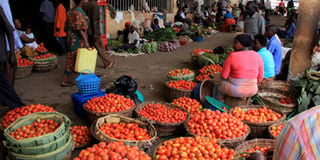Inflation drops to 3%

Food inflation. Vendors in Mbale market. Food crops and related items inflation increased to 2.5 per cent for the year ended March compared to 1.3 per cent recorded in February. PHOTO BY RACHEL MABALA
What you need to know:
- Energy Fuel and Utilities (EFU) inflation decreased to 7.7 per cent in March compared to 8 per cent in February due to a decline in solid fuels inflation, which fell to 25.8 per cent compared to 26.2 per cent in the period.
The decline in prices of clothes, footware and transport fares pushed down annual headline to 3 per cent compared to 3.4 per cent registered in the previous year.
However, it is not clear whether these prices will continue dropping or to rising due to the COVID-19 pandemic that has affected both lifestyles and the larger economy.
Covid-19 is expected to have far reaching implications. Government has already projected a slowdown in economic growth to 5.2 per cent from 6 per cent.
Ms Aliziki Kauda Lubega, the Uganda Bureau of Statistics (Ubos) director of macroeconomic, said the decrease in headline inflation was largely due to the low core inflation that was registered at 2.5 per cent for the year ended March compared to the 3.1 per cent in the same period last month.
“The decrease in core inflation is attributed to other goods inflation that [was] registered at 3.5 per cent for the year ended March compared to 4.2 per cent for the [period] ended February,” she said, noting in particular, clothing and footwear inflation decreased to 3 per cent in the period for compared to 3.5 per cent in February.
Services inflation, she noted, also decreased to 1.2 per cent compared to 1.6 per cent, while transport Inflation fell - 0.6 per cent in March compared to 1.5 per cent in February.
However, food crops and related items inflation increased to 2.5 per cent for the year ended March compared to 1.3 per cent recorded in February.
The increase, Ms Lubega said, was due to an increase in fruits inflation that grew to - 3.7 per cent for the year ended March compared to -12.4 per cent in February 2020.
In particular, annual inflation for bananas increased to -8 per cent in March compared to -22.5 per cent in February.
But annual vegetables inflation decreased to 8 per cent in the period compared to 12.5 per cent in February.
Ms Lubega said firewood inflation decreased -0.1 per cent in March compared to 2.9 per cent in February while annual petrol inflation remained at 8.8 per cent in the period, the same rate recorded in February.
In a monetary policy report last month, Bank of Uganda said whereas the inflation outlook was stable, external risks remain.




